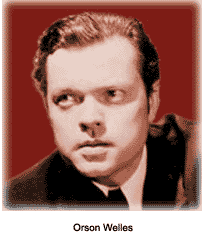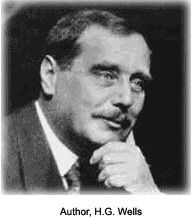On October 30th, 1938, hysteria and sheer panic shortened the breath of millions that were tuned in to radio station WABC and the Columbia Broadcasting System's coast-to-coast network. Director and theatrical genius, Orson Welles, frightened America with a live broadcast of a dramatization of H.G. Wells' fantasy, The War of the Worlds. His convincing and creative antics put fear into the hearts of the nation. "They're bombing New Jersey!"
The broadcast
In one of the most infamous stunts in broadcasting history, Welles' demonstrated an ability to dupe audiences in huge numbers.
 Halloween Eve, between 8:15 p.m. and 9 p.m., proved to be an all-too-perfect time for Welles to target his loyal listeners. In adapting the book for a radio play, Welles made an important change: Under his direction, the play was written and performed so that it would sound like a news broadcast about an invasion from Mars — a technique that Orson convincingly utilized to heighten the dramatic effect.
The following is quoted from an actor in the CBS studio, playing a newscaster in the field, persuasively describing the emergence of one of the aliens from its spacecraft:
Halloween Eve, between 8:15 p.m. and 9 p.m., proved to be an all-too-perfect time for Welles to target his loyal listeners. In adapting the book for a radio play, Welles made an important change: Under his direction, the play was written and performed so that it would sound like a news broadcast about an invasion from Mars — a technique that Orson convincingly utilized to heighten the dramatic effect.
The following is quoted from an actor in the CBS studio, playing a newscaster in the field, persuasively describing the emergence of one of the aliens from its spacecraft:
"Good heavens, something's wriggling out of the shadow like a gray snake. Now it's another one, and another. They look like tentacles to me. There, I can see the thing's body. It's large as a bear and it glistens like wet leather. But that face. It... it's indescribable. I can hardly force myself to keep looking at it. The eyes are black and gleam like a serpent. The mouth is V-shaped with saliva dripping from its rimless lips that seem to quiver and pulsate.... The thing is rising up. The crowd falls back. They've seen enough. This is the most extraordinary experience. I can't find words. I'm pulling this microphone with me as I talk. I'll have to stop the description until I've taken a new position. Hold on, will you please, I'll be back in a minute."A news bulletin followed that announced the impact of a meteor near Princeton, New Jersey, which "killed" 1,500 persons. Next, the broadcast chilled the air with a description of a "metal cylinder" containing strange creatures from Mars, armed with "death rays" to open hostilities against the earth's inhabitants. People scurried around in roads and parks, fled to roofs, hid in cellars, loaded guns, even wrapped their heads in wet handkerchiefs and towels for protection against Martian poison gas. Phone calls deluged the New York Times and New York Police Department all night. The scare goes nationwide Although most of the east coast's scare had subsided by the next day, thousands of uninformed citizens were still beside themselves. Newspaper offices, police and radio stations were besieged by calls from anxious relatives of New Jersey residents, and in some places apprehensive groups mulled the impending menace of a disastrous war. Most listeners who sought more information were confused about the reports they heard, and many became extremely upset when they learned that sheer fiction was the source of their alarm. San Francisco listeners apparently got the impression of an overwhelming force invading the United States from the air, cleaning out New York, and threatening to move westward. "My God," roared one inquirer into a telephone, "where can I volunteer my services? We've got to stop this awful thing."
The cause of terror Apparently, radio audiences either missed or failed to listen to the introduction, which announced: "The Columbia Broadcasting System and its affiliated stations present Orson Welles and the Mercury Theater on the Air in The War of the Worlds by H.G. Wells." Audiences also failed to connect the program with the newspaper listing, displayed as "Today: 8:00 - 9:00 — Play: H.G. Wells 'War of the Worlds' — WABC." Three additional announcements emphasized its fictional content. If members of the audience missed the brief explanation at the beginning, the next one didn't surface until 40 minutes into the lurid play. For many, the announcements became irrelevant or perhaps blocked out because of current global issues. Tensions in Europe were rising, and it wasn't uncommon for radio broadcasts to be interrupted by reports of ill-fated events. In fact, many listeners who panicked later testified that they had assumed that the invasion was actually a cagey disguise for a German attack. Most people who "freaked-out" were middle-aged or older. Children were least affected by the horrifying "news" of an alien invasion. Most youngsters recognized Orson Welles' low, trademark voice of the radio series hero, The Shadow.
Martians attack South America A similar dramatized broadcast of H.G. Wells' War of the Worlds became mistaken for real events. Panic and chaos prompted by a radio station in Quito, Ecuador, spread quickly through Santiago, Chile. The citizens of Quinto became outraged at the misleading report; a gang of angry people attacked the radio station and burned it to the ground.
Orson Welles Orson Welles was born on May 6th, 1915, in Kenosha, Wisconsin. His father was a successful inventor, his mother, a concert pianist. With plenty of help from his imaginative parents, Welles started out early in life as a gifted magician, pianist and painter. He was eight when his mother died, which projected him into a life of world travel with his father. When his father died (Orson was 12), he became the ward of Dr. Maurice Bernstein of Chicago. In 1931 Welles graduated from the Todd School in Woodstock, Illinois; at which time he turned down numerous college offers in favor of a sketching tour of Ireland. Welles made unsuccessful attempts to enter the London and Broadway stages. He even gave bullfighting a try in Morocco and Spain. Welles' New York acting debut in 1934 was his role as Tybalt in Romeo and Juliet. In the same year he married, directed his first short film, and spoke on radio for the first time. He began to work with John Houseman, forming the Mercury Theater with him in 1937. Although remembered mostly for his production of The Mercury Theater on the Air, Orson Welles contributed several other examples of creative imagination. In spite of Welles' many failed projects as a filmmaker, he won numerous awards and prizes for his unique creativity and determination. He received the American Film Institute's Lifetime Achievement Award, and in 1984 the Directors Guild of America awarded him its highest honor, the D.W. Griffith Award. On October 10, 1985, Orson Welles died of a heart attack in Hollywood, California. He was 70 years old.
The novel
Many people have confused the names H.G. Wells and Orson Welles. That they are one person is a common misconception that people have held since the release of the War of the Worlds broadcast.
 H.G. Wells was the author of the famous 1898 novel, The War of the Worlds. More than 100 years in print, Wells' novel has seen 158 uniquely designed covers by various artists. Creativity and detailed description saturate Wells' writing style. His skills and gifts put Wells at the top of his game.
War of the Worlds was written in the light of several historical events. Most important was the militarization of Germany, which spawned a number of novels predicting war in Europe — beginning with George Chesney's The Battle of Dorking (1871). Most of those ideas were written in semi-documentary style, which Wells also utilized by tying his interplanetary war tale to locations in England that were familiar to his readers. The successful attempt at realism fiction became a reality for Orson Welles' 1938 broadcast.
H.G. Wells was the author of the famous 1898 novel, The War of the Worlds. More than 100 years in print, Wells' novel has seen 158 uniquely designed covers by various artists. Creativity and detailed description saturate Wells' writing style. His skills and gifts put Wells at the top of his game.
War of the Worlds was written in the light of several historical events. Most important was the militarization of Germany, which spawned a number of novels predicting war in Europe — beginning with George Chesney's The Battle of Dorking (1871). Most of those ideas were written in semi-documentary style, which Wells also utilized by tying his interplanetary war tale to locations in England that were familiar to his readers. The successful attempt at realism fiction became a reality for Orson Welles' 1938 broadcast.